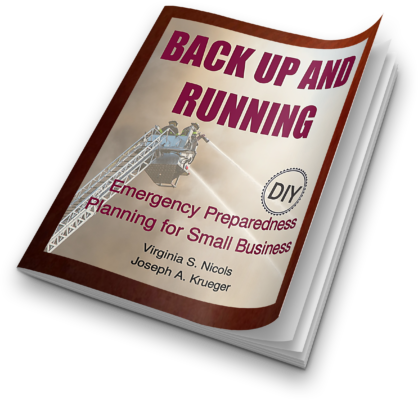Do you have a solid Business Contingency Plan?

Since my goal for summer is a series of simpler Advisories, here’s another quiz – this one, for business owners. The quiz isn’t just a quiz, though. It’s designed to kick-start a “to-do” list (for all that free time you have this summer!).
The quiz is meant to get you thinking about your Business Contingency Plan. How solid is it, really?
Does it need reviewing? Updating? Maybe even completion because a few pieces are missing? Every improvement you make will give your business a better chance of avoiding an emergency and making it through if something does happen. We all know by now that without a workable plan, ANY emergency could blow up into a full-fledged disaster. Nobody needs that!
Let’s start with key elements of a solid business contingency plan. For example, does your Plan include . . .
- Evacuation policies (Who turns off what? Who keeps track?)
- Adequate Shelter in Place supplies (What supplies? Where stored? How managed?)
- Procedures for Work-from-Home employees (Equipment? Software? Security?)
Your Plan may be complete, but is it up to date? For example:
- Have you updated your list of threats? New ones emerge every day! Cyber threats and financial challenges seem to be at the top of the list these days.
- Does your communications plan alert not just employees and employee families but other key players (customers, suppliers, regulators, etc.)? What if the emergency happens over the weekend or on a vacation day? A solid business contingency plan takes a look at the latest communications technologies. They are impressive!
- Given recent dangerous workplace incidents, should you update your security plan?
Often overlooked: Does your Plan consider Key Personnel?
- Does every key position have someone trained as back-up? That includes you, as owner!
- If a whole specialized team is suddenly knocked out (gets sick, for example), do you know where you’d hire a team of replacements – and where you’d put them?
- Who understands what the competition might do if your business closes? Is that person prepared with appropriate public relations messages?
Where’s the money going to come from in an emergency?
- How will you pay employees if the business is shut down? (Do they all have to be paid?)
- How will you deal with rent, utilities, etc. (Can any be cancelled, at least temporarily?)
- Will a business interruption trigger any fines for delays, broken contracts, etc.?
Does your Plan address potential legal exposure?
Are you doing what other owners in your industry are doing when it comes to planning for emergencies? If you don’t have a solid plan, could you be blamed for “negligent failure to plan?” You don’t need a lawsuit on top of your emergency!
This quiz is not a complete review! There are many, many more questions that can be asked to help identify a solid business contingency plan. We hope that the quiz has reassured you. If it hasn’t, perhaps your “to-do” list now includes setting up a meeting with your emergency management team, or your insurance agent or attorney.
Did too many of these quiz questions make you uneasy?
You may want to take a closer look at your Plan. For easy-to-follow guidance, we recommend our latest book, Back Up and Running.

More like a workbook than a text, Back Up and Running is written for business owners without any contingency plan. It covers all the basics using a 10-day schedule.
One of the experts who reviewed the book described it as “VERY high level.” I take that to be a polite way of saying it sticks to the basics and doesn’t get off into detailed weeds. . . which is exactly what it was meant to be! Take a look a the the book here, on Amazon. For $10, you may find yourself relieved – or inspired. Either way, a worthwhile investment.
Virginia
Your Emergency Plan Guide team
P.S. As always, let us know what “hit the spot!” when it comes to your business!
P.P.S. If you’re interested in other Advisories for business owners, you might find these useful:


